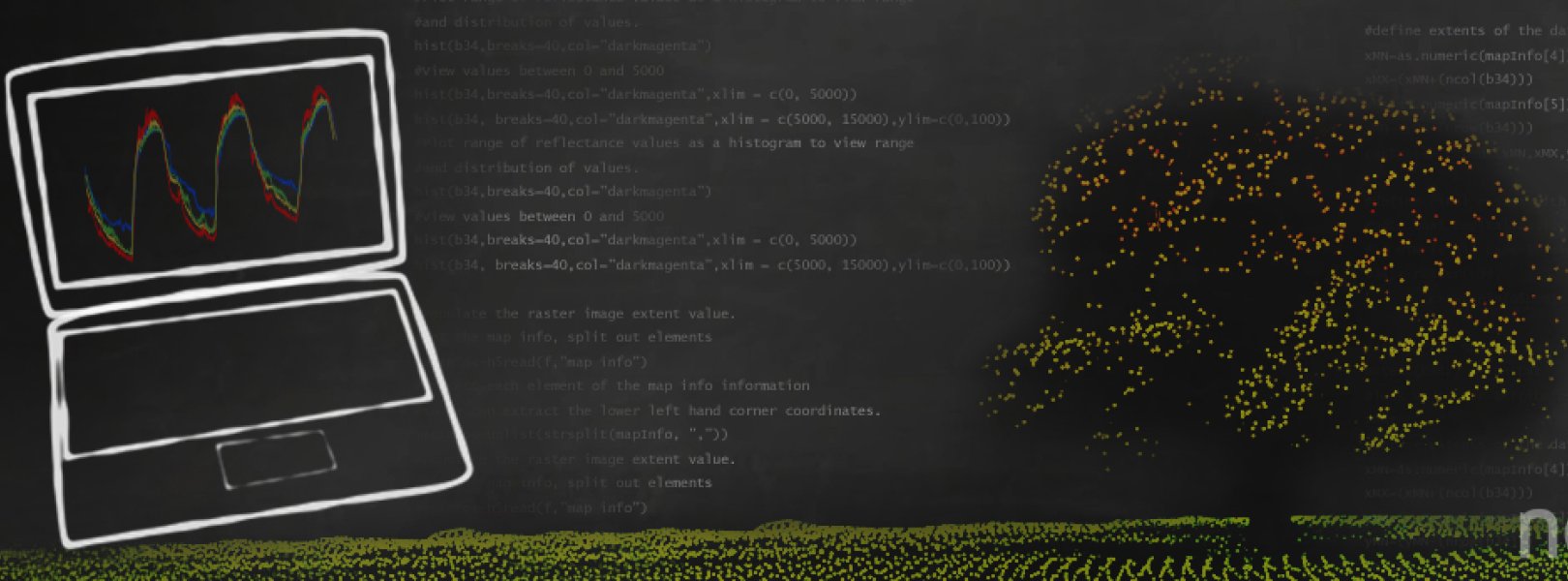Tutorials

Looking to improve your data skills using tools like R or Python? Want to learn more about working with a specific NEON data product? NEON develops online tutorials to help you improve your research. These self-paced tutorials are designed for you to used as standalone help on a single topic or as a series to learn new techniques.
Code for most script based tutorials can be downloaded at the end of the tutorial. Source files can also be found on GitHub. If you are interested in contributing a tutorial to this collection, please reach out using the Contact Us form, and we can guide you through the process of submitting resources to the GitHub repository.
All materials are freely available for you to use and reuse. We suggest the following citation for tutorials: [AUTHOR(S), NEON (National Ecological Observatory Network)]. Data Tutorial: [TUTORIAL NAME]. [URL] (accessed [DATE OF ACCESS]). See Citation Guidelines for examples, and for guidance in citing data and code.
Tutorials
Subsetting NEON HDF5 hyperspectral files to reduce file size
|
The Basics of LiDAR - Light Detection and Ranging - Remote Sensing
|
The Importance of Reproducible Science
|
The Relationship Between Raster Resolution, Spatial Extent & Number of Pixels
|
Time Series 00: Intro to Time Series Data in R - Managing Date/Time Formats
|
Time Series 01: Why Metadata Are Important: How to Work with Metadata in Text & EML Format
|
Time Series 02: Dealing With Dates & Times in R - as.Date, POSIXct, POSIXlt
|
Time Series 03: Cleaning & Subsetting Time Series Data in R - NoData Values & Subset by Date
|
Time Series 04: Subset and Manipulate Time Series Data with dplyr
|
Time Series 05: Plot Time Series with ggplot2 in R
|
Time Series 06: Create Plots with Multiple Panels, Grouped by Time Using ggplot Facets
|
Time Series Culmination Activity: Plot using Facets & Plot NDVI with Time Series Data
|
Understanding Releases and Provisional Data
|
Unsupervised Spectral Classification in Python: KMeans & PCA
|
Use the neonUtilities Package to Access NEON Data
|
Using an API Token when Accessing NEON Data with neonUtilities
|
Using neonUtilities in Python
|
Using the NEON API in R
|
Using the neonOS Package to Check for Duplicates and Join Tables
|
Using the neonstore Package to Download and Store NEON Data
|
Vector 00: Open and Plot Shapefiles in R - Getting Started with Point, Line and Polygon Vector Data
|
Vector 01: Explore Shapefile Attributes & Plot Shapefile Objects by Attribute Value in R
|
Vector 02: Plot Multiple Shapefiles and Create Custom Legends in Base Plot in R
|
Vector 03: When Vector Data Don't Line Up - Handling Spatial Projection & CRS in R
|
Vector 04: Convert from .csv to a Shapefile in R
|
Vector 05: Crop Raster Data and Extract Summary Pixels Values From Rasters in R
|
Version Control with GitHub
|
Visualize Elevation Changes Caused by the 2013 Colorado Floods using NEON LiDAR Data in R
|
What is a CHM, DSM and DTM? About Gridded, Raster LiDAR Data
|
Wildfire Change Exploration Using AOP Reflectance and Canopy Height Data in GEE
|